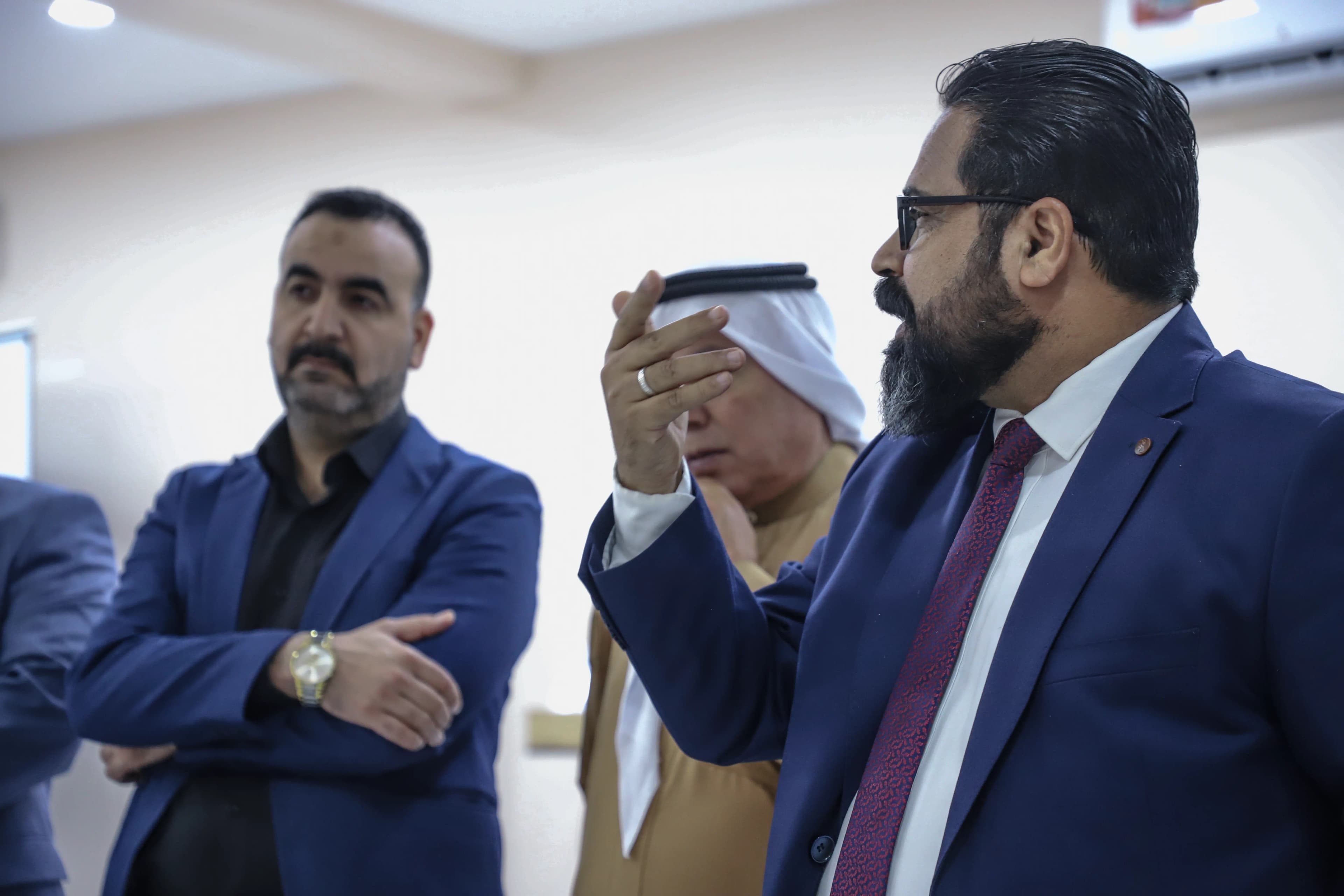Financial Education Training in Ninawa, Mosul
Recently, Yahya Abd Mahjoub, the Chairman of the East Gate for Economic Research and Market Studies, who is an accredited trainer by the International Labor Organization (ILO), completed a financial education course organized by the International Labor Organization (ILO) and the Lutheran World Federation. This course aimed to enhance financial concepts and mechanisms, promote economic awareness, and enable informed decision-making. His participation reflects the Center's commitment to collaborate with global organizations such as the International Labor Organization and the Lutheran World Federation to address key economic challenges and work towards sustainable development.
In an effort to empower and promote economic growth within the community, a financial Education course was organized in Ninawa Governorate, specifically in Mosul. The event took place at the vibrant Baghdad Hall in the Flowers District.

Caption: Yahya Abd Mahjoub, the Chairman of the East Gate for Economic Research & Market Studies, training a group of beneficiaries in the financial education course.
Encouraging Financial Independence and Gender Equality
The course primarily focused on the residents of Ninawa Governorate and Mosul city. They adopted an approach that emphasized the empowerment of women, recognizing their essential and diverse roles in society. Furthermore, the program paid special attention to the younger generation and entrepreneurs, key players in the local economy.
The training included six women entrepreneurs, demonstrating their commitment to gender equality in accessing and managing financial resources. Given the current gender gap reality, their course included specialists in finance and socio-economic methods that promote renegotiating gender relations and support women's empowerment.

Caption: Yahya Abd Mahjoub and a group of beneficiaries discussing financial goals in the financial Education course.
Addressing the Financial Awareness Gap
Financial exclusion and a lack of understanding of financial issues remain global problems. This gap is even more pronounced in regions like Ninawa Governorate and Mosul, where residents have experienced the impacts of terrorist and military operations or have returned from displacement. These communities face challenges in budgeting, income and expense planning, and utilizing loan and insurance services provided by financial institutions.
Financial Education plays a crucial role in mitigating these issues. It introduces individuals to the financial world and equips them with the necessary tools to manage their resources wisely. Financial education training materials aim to assist organizations supporting refugees, displaced individuals, host communities, youth, and teach them the basics of personal and family finance.
The course covers the following important topics:
- Setting financial goals
- Effective social communication
- Understanding financial tools such as savings, loans, installments, digital wallets, and insurance
- Negotiating with financial institutions
- Financial transfers and risk management

Caption: A group of beneficiaries discussing how to save in the financial Education course.
Bridging the Gap: Inclusivity and Adaptation
The training also aims to address differences in education levels and capacities between men and women, and between older and younger generations, which often affect financial decision-making in marginalized communities. The program is designed to tackle all the challenges and opportunities faced by refugees, displaced individuals, and their host communities. The program's lifespan exceeds a hundred years and has been implemented in more than forty countries worldwide through the dedicated efforts of the International Labor Organization.
The training took place from September 11 to 15, 2022, and was attended by a diverse group of beneficiaries from Mosul and various districts. Participants included youth, women, and laborers. The total number of program beneficiaries was 22 individuals, highlighting the tremendous potential of initiatives like these to achieve financial inclusion for the residents of Ninawa Governorate and their utilization of financial services offered by various financial institutions.
In conclusion, this financial training is more than just a simple course. It is a cornerstone in promoting financial independence and ultimately achieving financial well-being, promoting gender equality, and empowering the residents of Ninawa Governorate and Mosul with the necessary knowledge to manage their financial lives.
Our goal is to continue providing such opportunities and contribute to the development and prosperity of these communities in the years to come.
